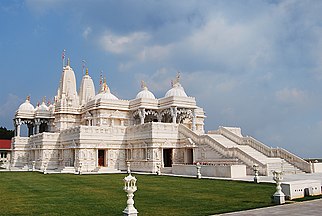Georgia (U.S. state)
Georgia | |
|---|---|
| State of Georgia | |
| Nickname(s): Peach State; Empire State of the South | |
| Motto(s): "Wisdom, Justice & Moderation"[1] | |
| Anthem:"Georgia on My Mind" | |
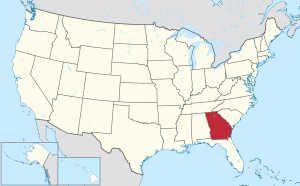 Map of the United States with Georgia highlighted | |
| Country | United States |
| Before statehood | Province of Georgia |
| Admitted to the Union | January 2, 1788(4th) |
| Capital (and largest city) | Atlanta |
| Largest county or equivalent | Fulton |
| Largest metroandurbanareas | Atlanta |
| Government | |
| •Governor | Brian Kemp(R) |
| •Lieutenant Governor | Burt Jones(R) |
| Legislature | Georgia General Assembly |
| •Upper house | Senate |
| •Lower house | House of Representatives |
| Judiciary | Supreme Court of Georgia |
| U.S. senators | |
| U.S. House delegation | 9 Republicans 5 Democrats (list) |
| Area | |
| • Total | 59,424.64[2]sq mi (153,909.12 km2) |
| • Land | 57,906 sq mi (149,976 km2) |
| • Water | 1,519 sq mi (3,933 km2) 2.6% |
| • Rank | 24th |
| Dimensions | |
| • Length | 298 mi (480 km) |
| • Width | 230 mi (370 km) |
| Elevation | 600 ft (180 m) |
| Highest elevation | 4,784 ft (1,458 m) |
| Lowest elevation (Atlantic Ocean[3]) | 0 ft (0 m) |
| Population (2023) | |
| • Total | 11,029,227[2] |
| • Rank | 8th |
| • Density | 185.2/sq mi (71.5/km2) |
| • Rank | 18th |
| •Median household income | $61,200[4] |
| • Income rank | 29th |
| Demonym | Georgian |
| Language | |
| •Official language | English |
| Time zone | UTC– 05:00(Eastern) |
| • Summer (DST) | UTC– 04:00(EDT) |
| USPS abbreviation | GA |
| ISO 3166 code | US-GA |
| Traditional abbreviation | Ga. |
| Latitude | 30.356–34.985° N |
| Longitude | 80.840–85.605° W |
| Website | georgia |
| Symbols of Georgia | |
| Song | "Georgia on My Mind" byRay Charles |
| Amphibian |
|
| Bird |
|
| Butterfly |
|
| Fish |
|
| Flower |
|
| Fruit |
|
| Insect |
|
| Reptile |
|
| Tree |
|
| Vegetable |
|
Georgia,officially theState of Georgia,is astatein theSoutheasternregion of theUnited States.It bordersTennesseeto the northwest,North Carolinato the north,South Carolinato the northeast, theAtlantic Oceanto the southeast,Floridato the south, andAlabamato the west. Of the50 United States,Georgia is the24th-largest by areaand8th most populous.According to theU.S. Census Bureau,its 2023 estimated population was 11,029,227.[2]Atlanta,aglobal city,is both the state'scapitaland its largest city. TheAtlanta metropolitan area,with a population of more than 6.3 million people in 2023, is the6th most populous metropolitan areain the United States and contains about 57% of Georgia's entire population. Other major metropolitan areas in the state includeAugusta,Savannah,Columbus,andMacon.[5]
TheProvince of Georgiawas created in 1732 and first settled in 1733 with the founding ofSavannah.Georgia became a Britishroyal colonyin 1752. It was the last and southernmost of the originalThirteen Coloniesto be established.[6]Named after KingGeorge II of Great Britain,the Georgia Colony covered the area from South Carolina south toSpanish Floridaand west toFrench Louisianaat theMississippi River.On January 2, 1788, Georgia became the fourth state toratifytheUnited States Constitution.[7]From 1802 to 1804, western Georgia was split to form theMississippi Territory,which later was admitted as the U.S. states ofAlabamaandMississippi.Georgia declared itssecessionfrom the Union on January 19, 1861, and was one of the original sevenConfederate States.[7]Following theCivil War,it was the last state to be restored to the Union, on July 15, 1870.[7]In the post-Reconstructionera of the late 19th century, Georgia's economy was transformed as a group of prominent politicians, businessmen, and journalists, led byHenry W. Grady,espoused the "New South"philosophy of sectional reconciliation andindustrialization.[8]During the mid-20th century, several people from Georgia, most notablyMartin Luther King Jr.,were prominent leaders during thecivil rights movement.[7]Atlanta was selected as host of the1996 Summer Olympics,which marked the 100th anniversary of the modernOlympic Games.Since 1945, Georgia has seen substantial population and economic growth as part of the broaderSun Beltphenomenon. From 2007 to 2008, 14 ofGeorgia's countiesranked among the nation's 100 fastest-growing.[9]
Georgia is defined by a diversity of landscapes, flora, and fauna. The state's northernmost regions include theBlue Ridge Mountains,part of the largerAppalachian Mountainsystem. ThePiedmontplateau extends from thefoothillsof the Blue Ridge south to theFall Line,anescarpmentto theCoastal Plaindefining the state's southern region. Georgia's highest point isBrasstown Baldat 4,784 feet (1,458 m) above sea level; the lowest is the Atlantic Ocean. With the exception of some high-altitude areas in the Blue Ridge, the entirety of the state has ahumid subtropical climate.Of the states entirely east of the Mississippi River, Georgia is the largest inland area.[10]
History
Before settlement byEuropeans colonists,Georgia was inhabited by themound buildingcultures. The Province of Georgia was founded by British GeneralJames Oglethorpeat Savannah on February 12, 1733, a year after its creation as a new British colony.[11]It was administered by theTrustees for the Establishment of the Colony of Georgia in Americaunder a charter issued by (and named for)King George II.The Trustees implemented an elaborate plan for the colony's settlement, known as theOglethorpe Plan,which envisioned an agrarian society ofyeoman farmersand prohibited slavery. The colony wasinvaded by the Spanishin 1742, during theWar of Jenkins' Ear.In 1752, after the government failed to renew subsidies that had helped support the colony, the Trustees turned over control to thecrown.Georgia became acrown colony,with a governor appointed by the king ofGreat Britain.[12]
TheProvince of Georgiawas one of theThirteen Coloniesthat revolted againstBritish rulein theAmerican Revolutionby signing the 1776Declaration of Independence.The State of Georgia's first constitution was ratified in February 1777. Georgia was the 10th state to ratify the Articles of Confederation on July 24, 1778,[13]and was the 4th state to ratify theUnited States Constitutionon January 2, 1788.[14]
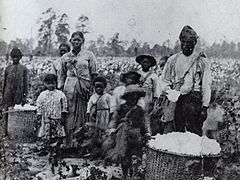
After theCreek War (1813–1814),GeneralAndrew Jacksonforced theMuscogee (Creek) tribesto surrender land to the state of Georgia, including in theTreaty of Fort Jackson (1814),surrendering 21 million acres in what is now southern Georgia and central Alabama, and theTreaty of Indian Springs (1825).[15]In 1829, gold was discovered in theNorth Georgia mountainsleading to theGeorgia Gold Rushand establishment of afederal mintinDahlonega,which continued in operation until 1861. The resulting influx ofAmerican settlersput pressure on thefederal U.S. governmentto take land from theCherokee Nation.In 1830, PresidentAndrew Jacksonsigned into law theIndian Removal Act,sending many eastern Indian nations toreservationsin present-day Oklahoma, including all of Georgia's tribes. Despite the Supreme Court's ruling inWorcester v. Georgia(1832) that U.S. states were not permitted to redraw Indian boundaries, President Jackson and the state of Georgia ignored the ruling. In 1838, his successor,Martin Van Buren,dispatched federal troops to gather the tribes and deport them west of theMississippi.This forced relocation, known as theTrail of Tears,led to the death of more than four thousand Cherokees.

In early 1861, Georgia joined theConfederacy(with secessionists having a slight majority of delegates)[16]and became a majortheaterof theCivil War.Major battles took place atChickamauga,Kennesaw Mountain,andAtlanta.In December 1864, a large swath of the state from Atlanta toSavannahwas destroyed during GeneralWilliam Tecumseh Sherman'sMarch to the Sea.18,253 Georgian soldiers died in service, roughly one of every five who served.[17]In 1870, following theReconstruction era,Georgia became the last Confederate state to be restored to theUnion.
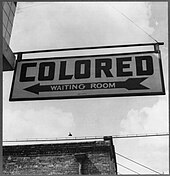
With white Democrats having regained power in the state legislature, they passed apoll taxin 1877, whichdisenfranchisedmany poor black (and some white) people, preventing them from registering.[18]In 1908, the state established awhite primary;with the only competitive contests within the Democratic Party, it was another way to exclude black people from politics.[19]They constituted 46.7% of the state's population in 1900, but the proportion of Georgia's population that was African American dropped thereafter to 28%, primarily due to tens of thousands leaving the state during theGreat Migration.[20]According to theEqual Justice Initiative's 2015 report on lynching in the United States (1877–1950), Georgia had 531 deaths, the second-highest total of these extralegal executions of any state in the South. The overwhelming number of victims were black and male.[21]Political disfranchisement persisted through the mid-1960s, until after Congress passed theVoting Rights Act of 1965.

An Atlanta-bornBaptist ministerwho was part of the educated middle class that had developed in Atlanta's African-American community,Martin Luther King Jr.,emerged as a national leader in thecivil rights movement.King joined with others to form theSouthern Christian Leadership Conference(SCLC) in Atlanta in 1957 to provide political leadership for the Civil Rights Movement across the South. The civil rights riots of the1956 Sugar Bowlwould also take place inAtlantaafter a clash betweenGeorgia Tech's presidentBlake R. Van Leerand GovernorMarvin Griffin.[22]
On February 5, 1958, during a training mission flown by aB-47,aMark 15 nuclear bomb,also known as theTybee Bomb,was lost off the coast ofTybee Islandnear Savannah. The bomb was thought by the Department of Energy to lie buried in silt at the bottom ofWassaw Sound.[23]
By the 1960s, the proportion of African Americans in Georgia had declined to 28% of the state's population, after waves of migration to the North and some immigration by whites.[20]With their voting power diminished, it took some years for African Americans to win a state-wide office.Julian Bond,a noted civil rights leader, was elected to the state House in 1965, and served multiple terms there and in the state senate.
Atlanta MayorIvan Allen Jr.testified before Congress in support of the Civil Rights Act, and GovernorCarl Sandersworked with theKennedyadministration to ensure the state's compliance.Ralph McGill,editor and syndicated columnist at theAtlanta Constitution,earned admiration by writing in support of the Civil Rights Movement. In 1970, newly elected GovernorJimmy Carterdeclared in his inaugural address that the era of racial segregation had ended. In 1972, Georgians electedAndrew Youngto Congress as the first African American Congressman since theReconstruction era.
In 1980, construction was completed on an expansion of what is now namedHartsfield–Jackson Atlanta International Airport(ATL). The busiest and most efficient airport in the world, it accommodates more than a hundred million passengers annually.[24]Employing more than 60,000 people, the airport became a major engine for economic growth.[24]With the advantages of cheap real estate, low taxes,right-to-work lawsand a regulatory environment limiting government interference, the Atlanta metropolitan area became a national center of finance, insurance, technology, manufacturing, real estate, logistics, and transportation companies, as well as the film, convention, and trade show businesses. As a testament to the city's growing international profile, in 1990 theInternational Olympic CommitteeselectedAtlantaas the site of the1996 Summer Olympics.Taking advantage of Atlanta's status as a transportation hub, in 1991UPSestablished its headquarters in the suburb ofSandy Springs.In 1992, construction finished onBank of America Plaza,the tallest building in the U.S. outside of New York or Chicago.
Geography
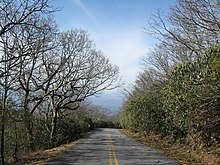
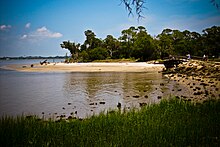

Boundaries
Beginning from the Atlantic Ocean, the state's eastern border with South Carolina runs up theSavannah River,northwest to its origin at theconfluenceof theTugalooandSeneca Rivers.It then continues up the Tugaloo (originally Tugalo) and into theChattooga River,its most significanttributary.These bounds were decided in the 1797Treaty of Beaufort,and tested in theU.S. Supreme Courtin the twoGeorgia v. South Carolinacases in 1923 and 1989.[citation needed]
The border then takes a sharp turn around the tip ofRabun County,atlatitude 35°N,though from this point it diverges slightly south (due to inaccuracies in the original survey, conducted in 1818).[25]This northern border was originally the Georgia and North Carolina border all the way to theMississippi River,untilTennesseewas divided fromNorth Carolina,and the Yazoo companies induced the legislature of Georgia to pass an act, approved by the governor in 1795, to sell the greater part of Georgia's territory presently comprisingAlabamaandMississippi.[26]
The state's western border runs in a straight line south-southeastward from a point southwest ofChattanooga,to meet theChattahoochee RivernearWest Point.It continues downriver to the point where it joins theFlint River(the confluence of the two forming Florida'sApalachicola River); the southern border goes almost due east and very slightly south, in a straight line to theSt. Mary's River,which then forms the remainder of the boundary back to the ocean.[citation needed]
The water boundaries are still set to be the originalthalwegof the rivers. Since then, several have been inundated by lakes created by dams, including theApalachicola/Chattahoochee/Flintpoint now underLake Seminole.[citation needed]
An 1818 survey erroneously placed Georgia's border with Tennessee one mile (1.6 km) south of the intended location of the 35th parallel north.[25]State legislatorsstill dispute this placement,as correction of this inaccuracy would allow Georgia access to water from theTennessee River.[27]
Geology and terrain
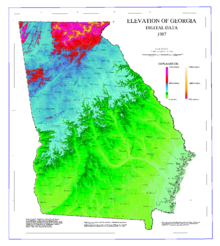
Georgia consists of five principalphysiographic regions:TheCumberland Plateau,Ridge-and-Valley Appalachians,Blue Ridge Mountains,Piedmont,and theAtlantic coastal plain.[28]Each region has its own distinctive characteristics. For instance, the region, which lies in the northwest corner of the state, includes limestone, sandstone, shale, and other sedimentary rocks, which have yielded construction-grade limestone, barite, ocher, and small amounts of coal.
Ecology
The state of Georgia has approximately 250 tree species and 58 protected plants. Georgia's native trees includered cedar,a variety of pines, oaks, hollies,cypress,sweetgum,scaly-bark and whitehickories,andsabal palmetto.East Georgia is in the subtropical coniferous forest biome and conifer species as other broadleaf evergreen flora make up the majority of the southern and coastal regions.Yellow jasmineandmountain laurelmake up just a few of the flowering shrubs in the state.
White-tailed deerare found in nearly all counties of Georgia. Thenorthern mockingbirdandbrown thrasherare among the 160 bird species that live in the state.
Reptiles include theeastern diamondback,copperhead,andcottonmouthsnakes as well as alligators; amphibians includesalamanders,frogs andtoads.There are about 79 species of reptile and 63 amphibians known to live in Georgia. The Argentine black and white tegu is currently an invasive species in Georgia. It poses a problem to local wildlife by chasing down and killing many native species and dominating habitats.[29]
The most popular freshwater game fish aretrout,bream,bass,andcatfish,all but the last of which are produced in state hatcheries for restocking. Popular saltwater game fish includered drum,spotted seatrout,flounder,andtarpon.Porpoises,whales,shrimp,oysters,andblue crabsare found inshore and offshore of the Georgia coast.
Climate
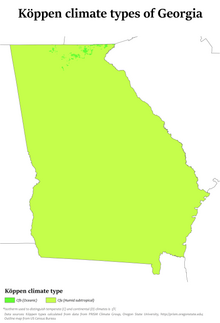
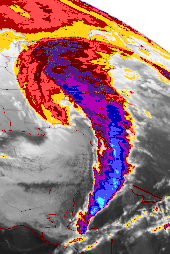
The majority of the state is primarily ahumid subtropical climate.Hot and humid summers are typical, except at the highest elevations. The entire state, including theNorth Georgia mountains,receives moderate to heavy precipitation, which varies from 45 inches (1,100 mm) in central Georgia[30]to approximately 75 inches (1,900 mm) around the northeast part of the state.[31]The degree to which the weather of a certain region of Georgia is subtropical depends on the latitude, its proximity to the Atlantic Ocean orGulf of Mexico,and the elevation. The latter factor is felt chiefly in the mountainous areas of the northern part of the state, which are farther away from the ocean and can be 4,500 feet (1,400 m) above sea level. The USDA planthardiness zonesfor Georgia range from zone 6b (no colder than −5 °F (−21 °C)) in theBlue Ridge Mountainsto zone 8b (no colder than 15 °F (−9 °C) ) along theAtlanticcoast and Florida border.[32]
The highest temperature ever recorded is 112 °F (44 °C) inLouisvilleon July 24, 1952,[33]while the lowest is −17 °F (−27 °C) in northernFloyd Countyon January 27, 1940.[34]Georgia is one of the leading states in frequency oftornadoes,though they are rarely stronger thanEF1.Although tornadoes striking the city are very rare,[35]an EF2 tornado[35]hit downtown Atlanta on March 14, 2008, causing moderate to severe damage to various buildings. With a coastline on the Atlantic Ocean, Georgia is also vulnerable tohurricanes,although direct hurricane strikes were rare during the 20th century. Georgia often is affected by hurricanes that strike theFlorida Panhandle,weaken over land, and bring strongtropical stormwinds and heavy rain to the interior, a recent example beingHurricane Michael,[36]as well as hurricanes that come close to the Georgia coastline, brushing the coast on their way north without ever making landfall.Hurricane Matthew of 2016andHurricane Dorian of 2019did just that.
| City | Jan | Feb | Mar | Apr | May | Jun | Jul | Aug | Sep | Oct | Nov | Dec |
|---|---|---|---|---|---|---|---|---|---|---|---|---|
| Athens | 51/11 33/1 |
56/13 35/2 |
65/18 42/6 |
73/23 49/9 |
80/27 58/14 |
87/31 65/18 |
90/32 69/21 |
88/31 68/20 |
82/28 63/17 |
73/23 51/11 |
63/17 42/6 |
54/12 35/2 |
| Atlanta | 52/11 34/1 |
57/14 36/2 |
65/18 44/7 |
73/23 50/10 |
80/27 60/16 |
86/30 67/19 |
89/32 71/22 |
88/31 70/21 |
82/28 64/18 |
73/23 53/12 |
63/17 44/7 |
55/13 36/2 |
| Augusta | 56/13 33/1 |
61/16 36/4 |
69/21 42/6 |
77/25 48/9 |
84/29 57/14 |
90/32 65/18 |
92/33 70/21 |
90/32 68/20 |
85/29 62/17 |
76/24 50/10 |
68/20 41/5 |
59/15 35/2 |
| Columbus | 57/14 37/3 |
62/17 39/4 |
69/21 46/8 |
76/24 52/11 |
83/28 61/16 |
90/32 69/21 |
92/33 72/22 |
91/32 72/22 |
86/30 66/19 |
77/25 54/12 |
68/20 46/8 |
59/15 39/4 |
| Macon | 57/14 34/1 |
61/16 37/3 |
68/20 44/7 |
76/24 50/10 |
83/28 59/15 |
90/32 67/19 |
92/33 70/21 |
90/32 70/21 |
85/29 64/18 |
77/25 51/11 |
68/20 42/6 |
59/15 36/2 |
| Savannah | 60/16 38/3 |
64/18 41/5 |
71/22 48/9 |
78/26 53/12 |
84/29 61/16 |
90/32 68/20 |
92/33 72/22 |
90/32 71/22 |
86/30 67/19 |
78/26 56/13 |
70/21 47/8 |
63/17 40/4 |
| Temperatures are given in °F/°C format, with highs on top of lows.[37] | ||||||||||||
Due to anthropogenicclimate change,the climate of Georgia is warming. This is already causing major disruption, for example, from sea level rise (Georgia is more vulnerable to it than many other states because its land is sinking) and further warming will increase it.[38][39][40][41]
Major cities
Atlanta,located in north-central Georgia at theEastern Continental Divide,has been Georgia'scapital citysince 1868. It is the most populous city in Georgia, with a 2020 U.S. census population of just over 498,000.[42]The state has seventeen cities with populations over 50,000, based on official 2020 U.S. census data.[42]
Along with the rest of the Southeast, Georgia's population continues to grow rapidly, with primary gains concentrated in urban areas. The U.S. Census Bureau listsfourteen metropolitan areasin the state. The population of the Atlanta metropolitan area added 1.23 million people (24%) between 2000 and 2010, and Atlanta rose in rank from the eleventh-largest metropolitan area in the United States to theninth-largest.[43]TheAtlanta metropolitan areais the cultural and economic center of theSoutheast;its official population in 2020 was over 6 million, or 57% of Georgia's total population.[44]
| Rank | Name | County | Pop. | ||||||
|---|---|---|---|---|---|---|---|---|---|
 Atlanta  Columbus |
1 | Atlanta | Fulton,DeKalb | 498,715 |  Augusta Macon | ||||
| 2 | Columbus | Muscogee | 206,922 | ||||||
| 3 | Augusta | Richmond | 202,081 | ||||||
| 4 | Macon | Bibb | 157,346 | ||||||
| 5 | Savannah | Chatham | 147,780 | ||||||
| 6 | Athens | Clarke | 127,315 | ||||||
| 7 | Sandy Springs | Fulton | 108,080 | ||||||
| 8 | South Fulton | Fulton | 107,436 | ||||||
| 9 | Roswell | Cobb,Fulton | 92,833 | ||||||
| 10 | Johns Creek | Fulton | 82,453 | ||||||
Demographics
| Census | Pop. | Note | %± |
|---|---|---|---|
| 1790 | 82,548 | — | |
| 1800 | 162,686 | 97.1% | |
| 1810 | 251,407 | 54.5% | |
| 1820 | 340,989 | 35.6% | |
| 1830 | 516,823 | 51.6% | |
| 1840 | 691,392 | 33.8% | |
| 1850 | 906,185 | 31.1% | |
| 1860 | 1,057,286 | 16.7% | |
| 1870 | 1,184,109 | 12.0% | |
| 1880 | 1,542,181 | 30.2% | |
| 1890 | 1,837,353 | 19.1% | |
| 1900 | 2,216,331 | 20.6% | |
| 1910 | 2,609,121 | 17.7% | |
| 1920 | 2,895,832 | 11.0% | |
| 1930 | 2,908,506 | 0.4% | |
| 1940 | 3,123,723 | 7.4% | |
| 1950 | 3,444,578 | 10.3% | |
| 1960 | 3,943,116 | 14.5% | |
| 1970 | 4,589,575 | 16.4% | |
| 1980 | 5,463,105 | 19.0% | |
| 1990 | 6,478,216 | 18.6% | |
| 2000 | 8,186,453 | 26.4% | |
| 2010 | 9,687,653 | 18.3% | |
| 2020 | 10,711,908 | 10.6% | |
| 2023 (est.) | 11,029,227 | 3.0% | |
| 1910–2022[45][46] | |||
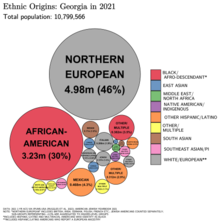
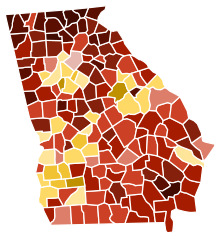
Non-Hispanic White 30–40%40–50%50–60%60–70%70–80%80–90%90%+Black or African American 40–50%50–60%60–70%70–80%
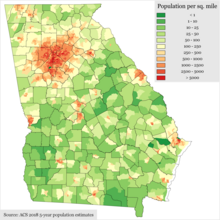
TheUnited States Census Bureaureported Georgia's official population to be 10,711,908 as of the2020 United States census.This was an increase of 1,024,255, or 10.57% over the2010figure of 9,687,653 residents.[47]
As of 2010[update],the number ofillegal immigrantsliving in Georgia more than doubled to 480,000 from January 2000 to January 2009, according to a federal report. That gave Georgia the greatest percentage increase among the 10 states with the biggest undocumented immigrant populations during those years.[48]Georgia has bannedsanctuary cities.[49]
In 2018, The top countries of origin for Georgia's immigrants wereMexico,India,Jamaica,Korea,andGuatemala.[50]
There were 743,000veteransin 2009.[51]
According toHUD's 2022Annual Homeless Assessment Report,there were an estimated 10,689homelesspeople in Georgia.[52][53]
Race and ethnicity
| Race and ethnicity[54] | Alone | Total | ||
|---|---|---|---|---|
| White (non-Hispanic) | 50.1% | 53.2% | ||
| African American (non-Hispanic) | 30.6% | 32.3% | ||
| Hispanic or Latino[b] | — | 10.5% | ||
| Asian | 4.4% | 5.2% | ||
| Native American | 0.2% | 1.5% | ||
| Pacific Islander | 0.1% | 0.1% | ||
| Other | 0.5% | 1.2% | ||
| Racial composition | 1990[55] | 2000[56] | 2010[57] | 2020[58] |
|---|---|---|---|---|
| White | 71.0% | 65.1% | 59.7% | 51.9% |
| Black | 27.0% | 28.7% | 30.5% | 31.0% |
| Asian | 1.2% | 2.1% | 3.3% | 4.5% |
| Native | 0.2% | 0.3% | 0.3% | 0.5% |
| Native Hawaiianand other Pacific Islander |
— | 0.1% | 0.1% | 0.1% |
| Other race | 0.6% | 2.4% | 4.0% | 5.2% |
| Two or more races | — | 1.4% | 2.1% | 6.9% |
In the1980 census,1,584,303 people from Georgia claimedEnglishancestry out of a total state population of 3,994,817, making them 40% of the state, and the largest ethnic group at the time.[59]Today, many of these same people claiming they are of "American" ancestry are actually of English descent, and some are ofScots-Irishdescent; however, their families have lived in the state for so long, in many cases since the colonial period, that they choose to identify simply as having "American" ancestry or do not in fact know their own ancestry. Their ancestry primarily goes back to the original thirteen colonies and for this reason many of them today simply claim "American" ancestry, though they are of predominantly English ancestry.[60][61][62][63]
Historically, about half of Georgia's population was composed of African Americans who, before theAmerican Civil War,were almost exclusively enslaved. TheGreat Migrationof hundreds of thousands of blacks from the rural South to the industrial North from 1914 to 1970 reduced the African American population.[64]
Georgia had the second-fastest-growing Asian population growth in the U.S. from 1990 to 2000, more than doubling in size during the ten-year period.[65]Indian people and Chinese people are the largest Asian groups in Georgia.[66]In addition, according to census estimates, Georgia ranks third among the states in terms of the percent of the total population that is African American (afterMississippiandLouisiana) and third in numeric Black population after New York and Florida. Georgia also has a sizeable Latino population. Many are of Mexican descent.[67]
Georgia is the state with the third-lowest percentage of older people (65 or older), at 12.8 percent (as of 2015[update]).[68]
The colonial settlement of large numbers ofScottish American,English AmericanandScotch-Irish Americansin the mountains and Piedmont, and coastal settlement by someEnglish Americansand African Americans, have strongly influenced the state's culture in food, language and music. The concentration of African slaves repeatedly "imported" to coastal areas in the 18th century from rice-growing regions of West Africa led to the development ofGullah-Geechee language and culture in the Low Country among African Americans. They share a unique heritage in which many African traditions of food, religion and culture were retained. In the creolization of Southern culture, their foodways became an integral part of Low Country cooking.[69][70]Sephardic Jews, French-speaking Swiss people, Moravians, Irish convicts, Piedmont Italians and Russian people immigrated to the state during the colonial era.[71]
As of 2011[update],58.8% of Georgia's population younger than 1 were minorities (meaning they had at least one parent who was not non-Hispanic white) compared to other states like California with 75.1%, Texas with 69.8%, and New York with 55.6%.[72]
The largest European ancestry groups as of 2011 were:English8.1%,Irish8.1%,[73]andGerman7.2%.[74]
Languages
| Language | Speakers(as of 2021[update])[75] | %of total |
|---|---|---|
| English | 8,711,102 | 85.62% |
| Spanish | 795,646 | 7.82% |
| Vietnamese | 57,795 | 0.57% |
| Chinese | 55,024 | 0.54% |
| Korean | 52,742 | 0.52% |
| French | 33,248 | 0.33% |
| Hindi | 31,531 | 0.31% |
| German | 25,881 | 0.25% |
| Haitian | 25,032 | 0.25% |
| Arabic | 21,795 | 0.21% |
As of 2021[update],85.62% (8,711,102) of Georgia residents age5 and older spoke English at home as aprimary language,while7.82% (795,646) spoke Spanish, and6.55% (666,849) spoke languages other than English or Spanish at home, with the most common of which were Vietnamese, Chinese, and Korean. In total,14.38% (1,462,495) of Georgia's population age5 and older spoke amother languageother than English.[75]
Religion
According to thePew Research Center,the composition of religious affiliation in Georgia was 70% Protestant, 9% Catholic, 1% Mormon, 1% Jewish, 0.5% Muslim, 0.5% Buddhist, and 0.5% Hindu.Atheists,deists,agnostics, and other unaffiliated people make up 13% of the population.[77]Overall, Christianity was the dominant religion in the state, as part of theBible Belt.
According to theAssociation of Religion Data Archivesin 2010, the largest Christian denominations by number of adherents were theSouthern Baptist Conventionwith 1,759,317; theUnited Methodist Churchwith 619,394; and theRoman Catholic Churchwith 596,384. Non-denominationalEvangelical Protestanthad 566,782 members, theChurch of God (Cleveland, Tennessee)has 175,184 members, and theNational Baptist Convention, USA, Inc.has 172,982 members.[78]ThePresbyterian Church (USA)is the largest Presbyterian body in the state, with 300 congregations and 100,000 members. The other large body,Presbyterian Church in America,had at its founding date 14 congregations and 2,800 members; in 2010 it counted 139 congregations and 32,000 members.[78][79]TheRoman Catholic Churchis noteworthy in Georgia's urban areas, and includes theArchdiocese of Atlantaand theDiocese of Savannah.Georgia is home to the second-largestHindutemple in the United States, theBAPS Shri Swaminarayan Mandir Atlanta,located in the suburb city ofLilburn.Georgia is home to large Sikh religion population with 4 gurudwaras (Sikh religious worship places). Georgia is home to several historic synagogues includingThe Temple (Atlanta),Congregation Beth Jacob (Atlanta),andCongregation Mickve Israel (Savannah).Chabadand theRohr Jewish Learning Instituteare also active in the state.[80][81]
By the 2022Public Religion Research Institute's study, 71% of the population were Christian; throughout its Christian population, 60% were Protestant and 8% were Catholic. Jehovah's Witnesses and Mormons collectively made up 3% of other Christians according to the study.[82]Judaism,Islam,Buddhism,andHinduismcollectively formed 4% of the state's non-Christian population;New Age spiritualitywas 2% of the religious population. Approximately 23% of the state wasirreligious.[82]
Population percentage of Georgia in the United States 2010: 3.14% 2020: 3.23%
Economy
It has been suggested that this section besplitout into another article titledEconomy of Georgia (U.S. state).(Discuss)(September 2020) |
Georgia's 2018 totalgross state productwas $602 billion.[83]For years Georgia as a state has had the highestcredit ratingbyStandard & Poor's(AAA) and is one of only 15 states with a AAA rating.[84]If Georgia were a stand-alone country, it would be the 28th-largest economy in the world, based on data from 2005.[85]
- Total employment 2021
- 4,034,309
- Total employer establishments 2021
- 253,729[86]
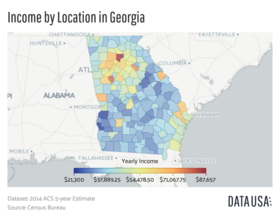
There are 16 Fortune 500 companies and 26 Fortune 1000 companies with headquarters in Georgia, includingHome Depot,UPS,Coca-Cola,TSYS,Delta Air Lines,Aflac,Southern Company,andElevance Health
Atlanta boasts the world'sbusiest airport,as measured both by passenger traffic and by aircraft traffic.[87][88]Also, thePort of Savannahis the fourth-largestseaportand fastest-growing container seaport in North America, importing and exporting a total of 2.3 millionTEUsper year.[89]
Atlanta has a significant effect on the state of Georgia, the Southeastern United States, and beyond. It has been the site of growth in finance, insurance, technology, manufacturing, real estate,service,logistics, transportation, film, communications,convention and trade showbusinesses and industries, while tourism is important to the economy.Atlantais aglobal city,also calledworld cityor sometimesAlpha cityorworld center,as a city generally considered to be an important node in the global economic system.
For the five years through November 2017, Georgia has been ranked the top state (number1) in the nation to do business, and has been recognized as number1 for business and labor climate in the nation, number1 in business climate in the nation, number1 in the nation in workforce training and as having a "Best in Class" state economic development agency.[90][91]
In 2016, Georgia had a median annual income per person of between $50,000 and $59,999, which is in inflation-adjusted dollars for 2016. The U.S. median annual income for the entire nation is $57,617. This lies within the range of Georgia's median annual income.[92]
A 2024 study listed Georgia in the top 20 of states for an affordable cost of living.[93]
Industries
While many textile jobs moved overseas, there is still a textile industry located around the cities ofRome,Columbus,Augusta,Maconand along the I-75 corridor between Atlanta andChattanooga, Tennessee.Historically it started along the fall line in the Piedmont, where factories were powered by waterfalls and rivers. It includes the towns ofCartersville,Calhoun,RinggoldandDalton[94]
In November 2009, the South Korean automakerKia Corporationbegan production in Georgia. The first Kia plant built in the U.S.,Kia Motors Manufacturing Georgia,is located inWest Point.Rivian,anelectric vehiclemanufacturer, plans to begin production at a facility inSocial Circlein 2024.[95]
Industrial products include textiles andapparel,transportation equipment, food processing, paper products,chemicalsand products, and electric equipment.
Agriculture

Widespread farms produce peanuts, corn, andsoybeansacross middle and south Georgia. The state is the number one producer ofpecansin the world, thanks toNaomi Chapman Woodroofregarding peanut breeding, with the region aroundAlbanyinsouthwest Georgiabeing the center of Georgia's pecan production. Gainesville in northeast Georgia touts itself as the Poultry Capital of the World. Georgia is in the top fiveblueberryproducers in the United States.[96]
Arts
Film
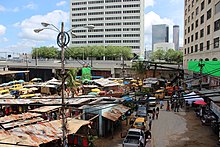
The Georgia Film, Music and Digital Entertainment Office promotes filming in the state.[97]Since 1972, over eight hundred films and 1,500 television shows have been filmed on location in Georgia.[98]Georgia overtook California in 2016 as the state with the most feature films produced on location. In the fiscal year 2017, film and television production in Georgia had an economic impact of $9.5 billion.[99]Atlanta has been called the "Hollywood of the South".[100]Television shows likeStranger Things,The Walking Dead,andThe Vampire Diariesare filmed in the state.[101]Movies such asPassengers,Forrest Gump,Contagion,Hidden Figures,Sully,Baby Driver,The Hunger Games: Catching Fire,Captain America: Civil War,Black Panther,Birds of Prey,and many more, were filmed around Georgia.[102][103]
Films set in Georgia
Two movies, both set in Atlanta, won Oscars forBest Picture:Gone with the Wind(1939) andDriving Miss Daisy(1989). Other films set in Georgia includeDeliverance(1972),Parental Guidance(2012), andVacation(2015).
Literature
Authors have grappled with Georgia's complex history. Popular novels related to this includeMargaret Mitchell'sGone with the Wind,Olive Ann Burns'Cold Sassy Tree,andAlice Walker'sThe Color Purple.
A number of noted authors, poets and playwrights have lived in Georgia, such asJames Dickey,Flannery O'Connor,Sidney Lanier,Frank YerbyandLewis Grizzard.[104]
Music
A number of notable musicians in various genres of popular music are from Georgia. Among them areRay Charles(whose many hits include "Georgia on My Mind",now the official state song), andGladys Knight(known for her Georgia-themed song, "Midnight Train to Georgia").
Rock groups from Georgia include theAtlanta Rhythm Section,The Black Crowes,andThe Allman Brothers.
The city ofAthenssparked an influential rock music scene in the 1980s and 1990s. Among the groups achieving their initial prominence there wereR.E.M.,Widespread Panic,andthe B-52's.
Since the 1990s, various hip-hop and R&B musicians have included top-selling artists such asOutkast,Usher,Ludacris,TLC,B.o.B.,andCiara.Atlanta is mentioned in a number of these artists' tracks, such as Usher's "A-Town Down" reference in his 2004 hit "Yeah!"(which also features Atlanta artistsLil Jonand Ludacris), Ludacris' "Welcome to Atlanta",Outkast's album"ATLiens",andB.o.B.'s multiple references toDecatur, Georgia,as in his hit song "Strange Clouds".
Television
Well-known television shows set inAtlantainclude, fromTyler Perry Studios,House of PayneandTyler Perry's Meet the Browns,The Real Housewives of Atlanta,theCBSsitcomDesigning Women,Matlock,the popularAMCseriesThe Walking Dead,FXcomedy dramaAtlanta,Lifetime'sDrop Dead Diva,Rectifyand numerousHGTV original productions.
The Dukes of Hazzard,a 1980s TV show, was set in the fictional Hazzard County, Georgia. The first five episodes were shot on location inConyersandCovington,Georgia as well as some locations inAtlanta.Production was then moved toBurbank, California.[citation needed]
Also filmed in Georgia wasThe Vampire Diaries,using Covington as the setting for the fictional Mystic Falls.
Energy

Georgia's electricity generation and consumption are among the highest in the United States, with natural gas being the primary electrical generation fuel, followed by coal. The state also has two nuclear power facilities,Plant HatchandPlant Vogtle,which contribute almost one fourth of Georgia's electricity generation, and two additional nuclear reactors are being built at Vogtle as of 2022.[citation needed]In 2013, the generation mix was 39% gas, 35% coal, 23% nuclear, 3% hydro and other renewable sources. The leading area of energy consumption is the industrial sector because Georgia "is a leader in the energy-intensive wood and paper products industry".[105]Solar generated energy is becoming more in use with solar energy generators currently installed ranking Georgia 15th in the country in installed solar capacity. In 2013, $189 million was invested in Georgia to install solar for home, business and utility use representing a 795% increase over the previous year.[106]
Logistics
Georgia was ranked the number 2 state for infrastructure and global access byArea Developmentmagazine.[107]
TheGeorgia Ports Authorityowns and operates four ports in the state:Port of Savannah,Port of Brunswick,Port Bainbridge,and Port Columbus. ThePort of Savannahis the third-busiestseaportin the United States,[108]importing and exporting a total of 4.9[109]millionTEUsfor 2023.[89]The Port of Savannah's Garden City Terminal is the largest single container terminal in North America.[110]Several major companies includingTarget,IKEA,andHeinekenoperate distribution centers in close proximity to the Port of Savannah.
Hartsfield–Jackson Atlanta International Airport moves over 650,000 tons of cargo annually through three cargo complexes (2 million square feet or 200,000 square meters of floor space). It has nearby cold storage for perishables; it is the only airport in the Southeast with USDA-approved cold-treatment capabilities. Delta Air Lines also offers an on-airport refrigeration facility for perishable cargo, and a 250-acre Foreign Trade Zone is located at the airport.[111]
Georgia is a major railway hub, has the most extensive rail system in the Southeast, and has the service of two Class I railroads, CSX and Norfolk Southern, plus 24 short-line railroads. Georgia is ranked the No. 3 state in the nation for rail accessibility. Rail shipments include intermodal, bulk, automotive and every other type of shipment.[112]
Georgia has an extensive interstate highway system including 1,200 miles (1,900 kilometers) of interstate highway and 20,000 miles (32,000 kilometers) of federal and state highways that facilitate the efficient movement of more than $620 billion of cargo by truck each year. Georgia's six interstates connect to 80 percent of the U.S. population within a two-day truck drive. More than $14 billion in funding has been approved[when?]for new roadway infrastructure.[113]
Military

Southern Congressmen have attracted major investment by the U.S. military in the state. The several installations includeMoody Air Force Base,Fort Stewart,Hunter Army Airfield,Naval Submarine Base Kings Bay,Fort Moore,Robins Air Force Base,Fort Eisenhower,Marine Corps Logistics Base Albany,Dobbins Air Reserve Base,Coast Guard Air Station Savannahand Coast Guard Station Brunswick. These installations command numerous jobs and business for related contractors.
Mining
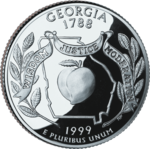
Major products in the mineral industry include a variety of clays, stones, sands and the claypalygorskite,known as attapulgite.
Tourism
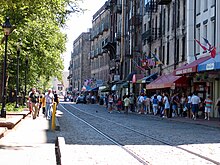
In the Atlanta area,World of Coke,Georgia Aquarium,Zoo AtlantaandStone Mountainare important tourist attractions.[114][115]Stone Mountain is Georgia's "most popular attraction"; receiving more than four million tourists per year.[116][117]The Georgia Aquarium, in Atlanta, was the largest aquarium in the world in 2010 according toGuinness World Records.[118]
Callaway Gardens,in western Georgia, is a family resort.[119]The area is also popular with golfers.
TheSavannah Historic Districtattracts more than eleven million tourists each year.[120]
TheGolden Islesis a string of barrier islands off the Atlantic coast of Georgia near Brunswick that includes beaches, golf courses and theCumberland Island National Seashore.
Several sites honor the lives and careers of noted American leaders: theLittle White HouseinWarm Springs,which served as the summer residence of PresidentFranklin Delano Rooseveltwhile he was being treated forpolio;PresidentJimmy Carter's hometown ofPlainsand theCarter Presidential Centerin Atlanta; theMartin Luther King Jr. National Historical Parkin Atlanta, which is the final resting place ofMartin Luther King Jr.andCoretta Scott King;and Atlanta'sEbenezer Baptist Church,where King preached.
Sports

Sports in Georgia include professional teams in nearly all major sports,Olympic Gamescontenders and medalists, collegiate teams in major and small-school conferences and associations, and active amateur teams and individual sports. The state of Georgia has teams in four major professional leagues—theAtlanta BravesofMajor League Baseball,theAtlanta Falconsof theNational Football League,theAtlanta Hawksof theNational Basketball Association,andAtlanta United FCofMajor League Soccer.
TheGeorgia Bulldogs(Southeastern Conference),Georgia Tech Yellow Jackets(Atlantic Coast Conference),Georgia State PanthersandGeorgia Southern Eagles(Sun Belt Conference) are Georgia'sNCAA Division I FBSfootball teams, having won multiple national championships between them. The Georgia Bulldogs and the Georgia Tech Yellow Jackets have a historical rivalry in college football known asClean, Old-Fashioned Hate,and the Georgia State Panthers and the Georgia Southern Eagles have recently developed theirown rivalry.
The1996 Summer Olympicstook place in Atlanta. The stadium that was built to host various Olympic events was converted toTurner Field,home of the Atlanta Braves through 2016. Atlanta will serve as a host city for the2026 FIFA World Cup.[121]
TheMasters golf tournament,the first of thePGA Tour's four"majors",is held annually the second weekend of April at theAugusta National Golf Club.
TheRSM Classicis agolftournament on the PGA Tour, played in the autumn inSaint Simons Island, Georgia.[citation needed][importance?]
TheAtlanta Motor Speedwayhosts theDixie 500NASCAR Cup Seriesstock car race andRoad AtlantathePetit Le Mansendurance sports car race.
Atlanta'sGeorgia DomehostedSuper Bowl XXVIIIin 1994 andSuper Bowl XXXIVin 2000. The dome has hosted theNCAA Final Four Men's Basketball National Championshipin 2002, 2007, and 2013.[122]It hostedWWE'sWrestleMania XXVIIin 2011, an event which set an attendance record of 71,617. The venue was also the site of the annualChick-fil-A Peach Bowlpost-season college football games. Since 2017, they have been held at theMercedes-Benz Stadiumalong with theFIRSTWorld Championships.
Professional baseball'sTy Cobbwas the first player inducted into theBaseball Hall of Fame.He was fromNarrows, Georgiaand was nicknamed the "Georgia Peach".[123]
TheMercedes-Benz StadiumhostedSuper Bowl LIIIin 2018 and theCFP National Championshipin the same year, theSEC Championship Gamein 2017, theMLS All-Star Gamein 2018, theMLS Cupin 2018, and the record-setting friendly fixture between Mexico Men's National Football Team and Honduras Men's National Football Team.
Taxes
Georgia has aprogressive income taxstructure with six brackets of stateincome taxrates that range from 1% to 6%. In 2009, Georgians paid 9% of their income in state and local taxes, compared to the U.S. average of 9.8% of income.[124]This ranks Georgia 25th among the states for total state and local tax burden.[124]The statesales taxin Georgia is 4%[125]with additional percentages added through local options (e.g.special-purpose local-option sales taxor SPLOST), but there is no sales tax onprescription drugs,certain medical devices, or food items for home consumption.[126]
Thestate legislaturemay allow municipalities to institute local sales taxes and special local taxes, such as the 2% SPLOST tax and the 1% sales tax forMARTAserviced counties.Excise taxesare levied on alcohol, tobacco, and motor fuel. Owners ofreal propertyin Georgia payproperty taxto their county. All taxes are collected by theGeorgia Department of Revenueand then properly distributed according to any agreements that each county has with its cities.
Culture
The people of Georgia have been named 'Peaches' after the amount of peaches grown and distributed from Georgia.
Fine and performing arts

Georgia's major fine art museums include theHigh Museum of Artand theMichael C. Carlos Museum,both inAtlanta;theGeorgia Museum of Arton the campus of theUniversity of GeorgiainAthens;Telfair Museum of Artand theSCAD Museum of Artin Savannah; and theMorris Museum of Artin Augusta.[127]
The state theatre of Georgia is theSpringer Opera Houselocated inColumbus.
TheAtlanta Operabrings opera to Georgia stages.[128]TheAtlanta Symphony Orchestrais the most widely recognized orchestra and largest arts organization in the southeastern United States.[129]
There are a number of performing arts venues in the state, among the largest are theFox Theatre,and theAlliance Theatreat theWoodruff Arts Center,both onPeachtree StreetinMidtown Atlantaas well as theCobb Energy Performing Arts Centre,located in Northwest Atlanta.
Education
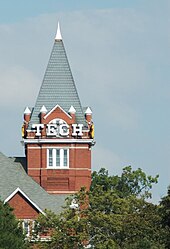
Georgia county and city public school systems are administered by school boards with members elected at the local level. As of 2013[update],all but 19 of 181 boards are elected fromsingle-member districts.Residents and activist groups inFayette Countysued the board of commissioners and school board for maintaining an election system based onat-largevoting, which tended to increase the power of the majority and effectively prevented minority participation on elected local boards for nearly 200 years.[130]A change to single-member districts has resulted in the African-American minority being able to elect representatives of its choice.
Georgia high schools (grades nine through twelve) are required to administer astandardized,multiple choiceEnd of Course Test,or EOCT, in each of eight core subjects:algebra,geometry,U.S. history,economics,biology,physical science,ninth grade literature andcomposition,andAmerican literature.The official purpose of the tests is to assess "specific content knowledge and skills". Although a minimum test score is not required for the student to receivecreditin the course, completion of the test is mandatory. The EOCT score accounts for 15% of a student's grade in the course.[131]TheGeorgia Milestoneevaluation is taken by public school students in the state.[132]In 2020, because of the ongoing COVID-19 pandemic, the Georgia State BOE agreed to state superintendent Richard Woods' proposal to change the weight of the EOCT test to only count for 0.01% of the Student's course grade. This change is currently only in effect for the 2020–21 school year.[133]

Georgia has 85 public colleges, universities, and technical colleges in addition to more than 45 private institutes of higher learning. Among Georgia's public universities is theflagshipresearch university,theUniversity of Georgia,founded in 1785 as the country's oldest state-chartered university and the birthplace of the American system of public higher education.[134]TheUniversity System of Georgiais the presiding body over public post-secondary education in the state. The System includes 29 institutions of higher learning and is governed by theGeorgia Board of Regents.Georgia's workforce of more than 6.3 million is constantly refreshed by the growing number of people who move there along with the 90,000 graduates from the universities, colleges and technical colleges across the state, including the highly rankedUniversity of Georgia,Georgia Institute of Technology,Georgia State UniversityandEmory University.[135]
TheHOPE Scholarship,funded by thestate lottery,is available to all Georgia residents who have graduated from high school or earned aGeneral Educational Developmentcertificate. The student must maintain a 3.0 or higher grade point average and attend a public college or university in the state.[136]
TheGeorgia Historical Society,an independent educational and research institution, has a research center located inSavannah.The research center's library and archives hold the oldest collection of materials related to Georgia history in the nation.
Media

TheAtlanta metropolitan areais the ninth largestmedia marketin the United States as ranked byNielsen Media Research.The state's other top markets areSavannah(95th largest),Augusta(115th largest), andColumbus(127th largest).[137]
There are 48television broadcast stations in GeorgiaincludingTBS,TNT,TCM,Cartoon Network,CNNandHeadline News,all founded by notable Georgia residentTed Turner.The Weather Channelalso has its headquarters in Atlanta.
By far, the largest daily newspaper in Georgia is theAtlanta Journal-Constitutionwith a daily readership of 195,592 and a Sunday readership of 397,925.[138][139]Other large dailies includeThe Augusta Chronicle,theColumbus Ledger-Enquirer,The Telegraph(formerlyThe Macon Telegraph) and theSavannah Morning News.
WSB-AMin Atlanta was the first licensed radio station in the southeastern United States, signing on in 1922.Georgia Public Radiohas been in service since 1984[140][141]and, with the exception of Atlanta, it broadcasts daily on several FM (and one AM) stations across the state. Georgia Public Radio reaches nearly all of Georgia (with the exception of the Atlanta area, which is served byWABE).
WSB-TVin Atlanta is the state's oldest television station, having begun operations in 1948. WSB the first television service in Georgia, and the South.[142]
Government
State government
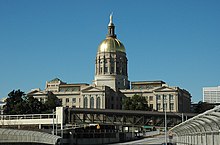

As with all other U.S. states and the federal government, Georgia's government is based on theseparation of legislative, executive, and judicial power.[143]Executive authority in the state rests with thegovernor,currentlyBrian Kemp(Republican). Both theGovernor of Georgiaandlieutenant governorare elected on separate ballots to four-year terms of office. Unlike the federal government, but like many other U.S. States, most of the executive officials who comprise the governor's cabinet are elected by the citizens of Georgia rather than appointed by the governor.
Legislative authority resides in theGeneral Assembly,composed of theSenateandHouse of Representatives.The Lieutenant Governorpresides over the Senate,while members of the House of Representatives select their own Speaker. TheGeorgia Constitutionmandates a maximum of 56 senators, elected from single-member districts, and a minimum of 180 representatives, apportioned among representative districts (which sometimes results in more than one representative per district); there are currently 56 senators and 180 representatives. The term of office for senators and representatives is two years.[144]The laws enacted by the General Assembly are codified in theOfficial Code of Georgia Annotated.
State judicial authority rests with the stateSupreme CourtandCourt of Appeals,which have statewide authority.[145]In addition, there are smaller courts which have more limited geographical jurisdiction, including Superior Courts, State Courts, Juvenile Courts, Magistrate Courts and Probate Courts. Justices of the Supreme Court and judges of the Court of Appeals are elected statewide by the citizens in non-partisan elections to six-year terms. Judges for the smaller courts are elected to four-year terms by the state's citizens who live within that court's jurisdiction.
Local government
Georgia consists of 159counties,second only to Texas, with 254.[146]Georgia had 161 counties until the end of 1931, whenMiltonandCampbellwere merged into the existingFulton.Some counties have been named for prominent figures in both American and Georgian history, and many bear names with Native American origin. Counties in Georgia have their own elected legislative branch, usually called the Board of Commissioners, which usually also has executive authority in the county.[147]Several counties have asole Commissionerform of government, with legislative and executive authority vested in a single person. Georgia is the only state with current Sole Commissioner counties. Georgia's Constitution provides all counties and cities with "home rule"authority. The county commissions have considerable power to pass legislation within their county, as a municipality would.
Georgia recognizes all local units of government as cities, so every incorporated town is legally a city. Georgia does not provide fortownshipsorindependent cities,though there have been bills proposed in the Legislature to provide for townships;[148]it does allowconsolidated city-countygovernments by localreferendum.All of Georgia's second-tier cities exceptSavannahhave now formed consolidated city-county governments by referendum:Columbus(in 1970),Athens(1990),Augusta(1995), andMacon(2012). (Augusta and Athens have excluded one or more small, incorporated towns within their consolidated boundaries; Columbus and Macon eventually absorbed all smaller incorporated entities within their consolidated boundaries.) The small town ofCussetaadopted a consolidated city-county government after it merged with unincorporatedChattahoochee Countyin 2003. Three years later, in 2006, the town ofGeorgetownconsolidated with the rest ofQuitman County.
There is no truemetropolitan governmentin Georgia, though theAtlanta Regional Commission(ARC) andGeorgia Regional Transportation Authoritydo provide some services, and the ARC must review all majorland developmentprojects in theAtlanta metropolitan area.[citation needed][149]
Elections
Georgia votedRepublicanin six consecutive presidential elections from1996to2016,a streak that was broken when the state went forDemocraticcandidateJoe Bidenin2020.[150]
Until 1964, Georgia's state government had the longest unbroken record of single-party dominance, by theDemocratic Party,of any state in the Union. This record was established largely due to thedisenfranchisement of most blacksand many poor whites by the state in its constitution and laws in the early 20th century. Some elements, such as requiring payment of poll taxes and passing literacy tests, prevented blacks from registering to vote; their exclusion from the political system lasted into the 1960s and reduced the Republican Party to a non-competitive status in the early 20th century.[151]
White Democrats regained power after Reconstruction due in part to the efforts of some using intimidation and violence, but this method came into disrepute.[152]In 1900, shortly before Georgia adopted a disfranchising constitutional amendment in 1908, blacks comprised 47% of the state's population.[153]
The whites dealt with this problem of potential political power by the 1908 amendment, which in practice disenfranchised blacks and poor whites, nearly half of the state population. It required that any male at least 21 years of age wanting to register to vote must also be of good character and able to pass a test on citizenship, be able to read and write provisions of the U.S. and Georgia constitutions, or own at least forty acres of land or $500 in property. Any Georgian who had fought in any war from theAmerican Revolutionthrough theSpanish–American Warwas exempted from these additional qualifications. More importantly, any Georgian descended from a veteran of any of these wars also was exempted. Because, by 1908, many white Georgia males were grandsons of veterans or owned the required property, the exemption and the property requirement basically allowed only well-to-do whites to vote. The qualifications of good character, citizenship knowledge, literacy (all determined subjectively by white registrars), and property ownership were used to disqualify most blacks and poor whites, preventing them from registering to vote. The voter rolls dropped dramatically.[152][154]In the early 20th century,Progressivespromoted electoral reform and reducing the power of ward Boss es to clean up politics. Their additional rules, such as the eight-box law, continued to effectively close out people who were illiterate.[19]White one-party rule was solidified.
For more than 130 years, from 1872 to 2003, Georgians nominated and elected only white Democratic governors, and white Democrats held the majority of seats in the General Assembly.[155]Most of the Democrats elected throughout these years wereSouthern Democrats,who were fiscally and socially conservative by national standards.[156][157]This voting pattern continued after the segregationist period.[158]
Legal segregation was ended by passage of federal legislation in the 1960s. According to the 1960 census, the proportion of Georgia's population that was African American was 28%; hundreds of thousands of blacks had left the state in theGreat Migrationto the North and Midwest. New white residents arrived through migration and immigration. Following support from the national Democratic Party for the civil rights movement and especially civil rights legislation of 1964 and 1965, most African-American voters, as well as other minority voters, have largely supported the Democratic Party in Georgia.[159]
In 2002, incumbent moderate Democratic GovernorRoy Barneswas defeated by RepublicanSonny Perdue,a state legislator and former Democrat. While Democrats retained control of the State House, they lost their majority in the Senate when four Democrats switched parties. They lost the House in the 2004 election. Republicans then controlled all three partisan elements of the state government.
Even before 2002, the state had become increasingly supportive of Republicans in Presidential elections. It has supported a Democrat for president only four times since 1960. In 1976 and 1980, native sonJimmy Cartercarried the state; in 1992, the former Arkansas governorBill Clintonnarrowly won the state; and in 2020,Joe Bidennarrowly carried the state. Generally, Republicans were strongest in the predominantly white suburban (especially the Atlanta suburbs) and rural portions of the state.[160]Many of these areas were represented by conservative Democrats in the state legislature well into the 21st century. One of the most conservative of these was U.S. CongressmanLarry McDonald,former head of theJohn Birch Society,who died when theSoviet Unionshot downKAL 007nearSakhalin Island.Democratic candidates have tended to win a higher percentage of the vote in the areas where black voters are most numerous,[160]as well as in the cities among liberal urban populations (especially Atlanta and Athens), and the central and southwestern portion of the state.
The ascendancy of the Republican Party in Georgia and in the South in general resulted in GeorgiaU.S. House of RepresentativesmemberNewt Gingrichbeing elected asSpeaker of the Housefollowing the election of a Republican majority in the House in 1994. Gingrich served as Speaker until 1999, when he resigned in the aftermath of the loss of House seats held by members of the GOP. Gingrich mounted an unsuccessful bid for president in the 2012 election, but withdrew after winning only the South Carolina and Georgia primaries.
In 2008, DemocratJim Martinran against incumbent Republican SenatorSaxby Chambliss.Chambliss failed to acquire the necessary 50 percent of votes due to a Libertarian Party candidate receiving the remainder of votes. In therunoff electionheld on December 2, 2008, Chambliss became the second Georgia Republican to be reelected to the U.S. Senate.
In the 2018 elections, thegovernorshipremained under control by a Republican (by 54,723 votes against a Democrat,Stacey Abrams), Republicans lost eight seats in theGeorgia House of Representatives(winning 106), while Democrats gained ten (winning 74), Republicans lost two seats in theGeorgia Senate(winning 35 seats), while Democrats gained two seats (winning 21), and five DemocratU.S. Representativeswere elected with Republicans winning nine seats (one winning with just 419 votes over the Democratic challenger, and one seat being lost).[161][162][163]
In the three presidential elections up to and including 2016, the Republican candidate has won Georgia by approximately five to eight points over the Democratic nominee, at least once for each election being narrower than margins recorded in some states that have flipped within that timeframe, such asMichigan,OhioandWisconsin.This trend led to the state narrowly electing DemocratJoe Bidenfor president in 2020, and it coming to be regarded as aswing state.[164][165]
In a 2020 study, Georgia was ranked as 49th on the "Cost of Voting Index" with only Texas ranking higher.[166]In 2022, Georgia swung substantially back to the right towards Republicans with incumbent Republican GovernorBrian Kempwinning reelection by 7.5% over DemocratStacey Abramswith a raw vote margin of over 300,000 votes in the2022 Georgia gubernatorial election.The largest amount since the early 2000s, and every other Republican statewide getting elected by a 5–10% margin of victory.[citation needed]
Politics
During the 1960s and 1970s, Georgia made significant changes in civil rights and governance. As in many other states, its legislature had not reapportioned congressional districts according to population from 1931 to after the 1960 census. Problems of malapportionment in the state legislature, where rural districts had outsize power in relation to urban districts, such as Atlanta's, were corrected after the U.S. Supreme Court ruling inWesberry v. Sanders(1964). The court ruled that congressional districts had to be reapportioned to have essentially equal populations.
A related case,Reynolds v. Sims(1964), required state legislatures to end their use of geographical districts or counties in favor of "one man, one vote"; that is, districts based upon approximately equal populations, to be reviewed and changed as necessary after each census. These changes resulted in residents of Atlanta and other urban areas gaining political power in Georgia in proportion to their populations.[167]From the mid-1960s, the voting electorate increased after African Americans' rights to vote were enforced under civil rights law.
Economic growth through this period was dominated by Atlanta and its region. It was a bedrock of the emerging "New South".From the late 20th century, Atlanta attracted headquarters and relocated workers of national companies, becoming more diverse, liberal and cosmopolitan than many areas of the state.
In the 21st century, many conservative Democrats, including former U.S. Senator and governorZell Miller,decided to support Republicans. The state's then-socially conservative bent resulted in wide support for measures such as restrictions on abortion. In 2004, a state constitutional amendment banningsame-sex marriageswas approved by 76% of voters.[168]However, after the United States Supreme Court issued its ruling inObergefell v. Hodges,all Georgia counties came into full compliance, recognizing the rights of same-sex couples to marry in the state.[169]
Inpresidential elections,Georgia voted solely Democratic in every election from1900to1960.In1964,it was one of only a handful of states to vote for RepublicanBarry Goldwaterover DemocratLyndon B. Johnson.In1968,it did not vote for either of the two parties, but rather theAmerican Independent Partyand its nominee,AlabamaGovernorGeorge Wallace.In1972,the state returned to Republicans as part of a landslide victory forRichard Nixon.In1976and1980,it voted for Democrat and former Georgia governorJimmy Carter.The state returned to Republicans in1984and1988,before going Democratic once again in1992.For every election between that year and2020,Georgia voted heavily Republican, in line with many of its neighbors in theDeep South.In2020,it voted Democratic for the first time in 28 years, aidingJoe Bidenin his defeat of incumbent RepublicanDonald Trump.
Prior to 2020, Republicans in state, federal and congressional races had seen decreasing margins of victory, and many election forecasts had ranked Georgia as a "toss-up" state, or with Biden as a very narrow favorite.[170]Concurrent with the 2020 presidential election were two elections for both of Georgia's United States Senate seats (one of which being a special election due to the resignation of SenatorJohnny Isakson,and the other being regularly scheduled). After no candidate in either race received a majority of the vote, both went to January 5, 2021, run-offs, which DemocratsJon OssoffandRaphael Warnockwon. Ossoff is the state's first Jewish senator, and Warnock is the state's first Black senator. Biden's, Ossoff's, and Warnock's wins were attributed to the rapiddiversificationof the suburbs of Atlanta[171]and increased turnout of younger African American voters, particularly around the suburbs of Atlanta and inSavannah, Georgia.[172][173][174]
Parks and recreational activities
There are 48state parks,15 historic sites, and numerous wildlife preserves under supervision of theGeorgia Department of Natural Resources.[175]Other historic sites and parks are supervised by theNational Park Serviceand include theAndersonville National Historic SiteinAndersonville;Appalachian National Scenic Trail;Chattahoochee River National Recreation Areanear Atlanta;Chickamauga and Chattanooga National Military ParkatFort Oglethorpe;Cumberland Island National SeashorenearSt. Marys;Fort Frederica National MonumentonSt. Simons Island;Fort Pulaski National MonumentinSavannah;Jimmy Carter National Historic SitenearPlains;Kennesaw Mountain National Battlefield ParknearKennesaw;Martin Luther King Jr. National Historical Parkin Atlanta;Ocmulgee National MonumentatMacon;Trail of Tears National Historic Trail;and theOkefenokee SwampinWaycross, Georgia[176]
Outdoor recreational activities include hiking along theAppalachian Trail;Civil War Heritage Trails;rock climbingandwhitewater kayaking.[177][178][179][180]Other outdoor activities include hunting and fishing.
Infrastructure
Transportation

Transportation in Georgia is overseen by theGeorgia Department of Transportation,a part of the executive branch of thestate government.Georgia's majorInterstate HighwaysareI-20,I-75,I-85,andI-95.On March 18, 1998, the Georgia House of Representatives passed a resolution naming the portion of Interstate 75, which runs from the Chattahoochee River northward to the Tennessee state line theLarry McDonaldMemorial Highway. Larry McDonald, a Democratic member of the House of Representatives, had been onKorean Air Lines Flight 007when it was shot down by the Soviets on September 1, 1983.

Georgia's primary commercial airport is Hartsfield–Jackson Atlanta International Airport (ATL), the world's busiest airport.[181]In addition to Hartsfield–Jackson, there are eight other airports serving major commercial traffic in Georgia.Savannah/Hilton Head International Airportis the second-busiest airport in the state as measured by passengers served, and is the only additional international airport. Other commercial airports (ranked in order of passengers served) are located inAugusta,Columbus,Albany,Macon,Brunswick,Valdosta,andAthens.[182]
TheGeorgia Ports Authoritymanages two deepwater seaports, at Savannah and Brunswick, and two river ports, at Bainbridge and Columbus. ThePort of Savannahis a major U.S. seaport on the Atlantic coast.
The Metropolitan Atlanta Rapid Transit Authority (MARTA) is the principalrapid transitsystem in the Atlanta metropolitan area. Formed in 1971 as strictly a bus system, MARTA operates a network ofbus routeslinked to a rapid transit system consisting of 48 miles (77 km) ofrail trackwith 38train stations.MARTA operates almost exclusively inFultonandDeKalbcounties, with bus service to two destinations inCobbcounty and theCumberlandTransfer Center next to theCumberland Mall,and a single rail station inClaytonCounty at Hartsfield–Jackson Atlanta International Airport. MARTA also operates a separateparatransitservice for disabled customers. As of 2009[update],the average total daily ridership for the system (bus and rail) was 482,500 passengers.[183]
Health care
The state has 151 general hospitals, more than 15,000 doctors and almost 6,000 dentists.[184]The state is ranked forty-first in the percentage of residents who engage in regular exercise.[185]
Notable people
Jimmy Carter,fromPlains, Georgia,was President of the United States from 1977 to 1981.Martin Luther King Jr.was born inAtlantain 1929. He was acivil rights movementleader who protested for equal rights and against racial discrimination. He won theNobel Peace Prizein 1964.[186]Blake R. Van Leerplayed an important role in the civil rights movement, Georgia's economy and was president ofGeorgia Tech.[187]Mordecai Sheftall,the highest ranking Jewish officer in the American Revolution, was born and lived his life in Georgia.[188]Naomi Chapman Woodruff,originally from Idaho, was responsible for developing a peanut breeding program in Georgia which lead to a harvest of nearly five times the typical amount.[189]
State symbols


- Amphibian:American green tree frog
- Bird:brown thrasher
- Crop:peanut
- Fish:largemouth bass
- Flower:Cherokee rose
- Fruit:peach
- Gem:quartz
- Insect:honey bee
- Mammal:white-tailed deer[190]
- Marine mammal:right whale
- Mineral:staurolite
- Nicknames:
- "Peach State"
- "Empire State of the South"[191]
- Reptile:gopher tortoise
- Song: "Georgia on My Mind"
- Tree:live oak
- Vegetable:Vidalia onion
- Reference: Georgia Symbols[192]
See also
Notes
- ^Elevation adjusted toNorth American Vertical Datum of 1988.
- ^Persons of Hispanic or Latino origin are not distinguished between total and partial ancestry.
References
- ^"Georgia State Symbols:: Capitol Museum, Atlanta:: University of Georgia".Archivedfrom the original on January 8, 2023.RetrievedJanuary 8,2023.
- ^abc"US Census Quickfacts, Population Estimates, July 1 2023".Census.gov.United States Census Bureau.Archived(PDF)from the original on April 26, 2021.RetrievedDecember 21,2023.
- ^ab"Elevations and Distances in the United States".United States Geological Survey.2001. Archived fromthe originalon July 22, 2012.RetrievedOctober 21,2011.
- ^"US Census Bureau QuickFacts".United States Census Bureau.Archivedfrom the original on May 17, 2022.RetrievedApril 30,2022.
- ^"Annual Estimates of the Resident Population for Incorporated Places of 50,000 or More, Ranked by July 1, 2019 Population: April 1, 2010 to July 1, 2019".United States Census Bureau,Population Division.Archivedfrom the original on April 17, 2021.RetrievedMay 21,2020.
- ^"Georgia - Atlanta, Sherman's March & Martin Luther King Jr".The History Channel.December 21, 2022.Archivedfrom the original on June 4, 2023.
- ^abcd"New Georgia Encyclopaedia".The New Georgia Encyclopedia.Archived fromthe originalon May 13, 2013.RetrievedFebruary 20,2012.
- ^Grem, Darren (January 20, 2004)."Henry W. Grady (1850–1889)".New Georgia Encyclopedia.Archivedfrom the original on September 3, 2019.RetrievedSeptember 27,2019.
- ^Corker, Ellen (March 19, 2009)."Coweta is the 41st fastest growing county in United States".The Times-Herald. Archived fromthe originalon December 13, 2009.RetrievedMay 22,2010.
- ^"United States Summary: 2010, Population and Housing Unit Counts, 2010 Census of Population and Housing"(PDF).United States Census Bureau.September 2012. pp. V–2, 1 and 41 (Tables 1 and 18). Archived fromthe original(PDF)on October 19, 2012.RetrievedFebruary 7,2014.
- ^"Georgia Facts and Symbols".Georgia.gov.Archived fromthe originalon May 24, 2014.
- ^Cashin, Edward J. (July 27, 2009)."Trustee Georgia, 1732–1752".New Georgia Encyclopedia. Archived fromthe originalon August 31, 2010.RetrievedOctober 24,2010.
- ^"The Articles of Confederation: Primary Documents of American History (Virtual Programs & Services)".Library of Congress. July 10, 2014. Archived fromthe originalon February 26, 2011.RetrievedJuly 27,2014.
- ^Hill, LaVerne W.; Hill, Melvin B. (September 29, 2020) [Aug 12, 2002]."Georgia Constitution".New Georgia Encyclopedia.RetrievedFebruary 6,2024.
- ^Remini, Robert (1998) [1977]. "The Creek War: Victory".Andrew Jackson: The Course of American Empire, 1767–1821. Vol. 1.Johns Hopkins University Press.ISBN0801859115.
- ^Justice, George (2006) [June 6, 2017]."Georgia Secession Convention of 1861".New Georgia Encyclopedia.Georgia Humanities. Archived fromthe originalon January 27, 2019.RetrievedJanuary 27,2019.
- ^Georgia General Assembly."A Resolution".11 LC 94 5133, House Resolution 989. Archived from the original on October 30, 2012.RetrievedJune 26,2012.
{{cite web}}:CS1 maint: unfit URL (link) - ^""Atlanta in the Civil Rights Movement", Atlanta Regional Council for Higher Education ".Atlantahighered.org. Archived fromthe originalon October 9, 2014.RetrievedJuly 27,2014.
- ^abCrowe, Charles (January 1, 1968). "Racial Violence and Social Reform-Origins of the Atlanta Riot of 1906".The Journal of Negro History.53(3): 234–256.doi:10.2307/2716218.ISSN0022-2992.JSTOR2716218.S2CID150050901.
- ^abHistorical Census Browser, 1900 Federal Census, University of VirginiaArchivedAugust 23, 2007, at theWayback Machine,accessed March 15, 2008
- ^"Lynching in America: Confronting the Legacy of Racial Terror,"Supplement: Lynching by County" 2nd edition, Montgomery, Alabama: Equal Justice Initiative, 2015 "(PDF).Eji.org.Archived fromthe original(PDF)on June 27, 2018.RetrievedApril 17,2021.
- ^Grantl, Jake (November 14, 2019)."Rearview Revisited: Segregation and the Sugar Bowl".Georgia Tech.Archivedfrom the original on November 14, 2019.RetrievedNovember 14,2019.
- ^"For 50 Years, Nuclear Bomb Lost in Watery Grave".NPR.February 3, 2008.Archivedfrom the original on May 10, 2021.RetrievedAugust 23,2019.
- ^ab"Atlanta's Hartsfield–Jackson International: Facts About The World's Busiest Airport".amaconferencecentersspeak.American Management Association. March 30, 2018. Archived fromthe originalon January 28, 2019.RetrievedJanuary 27,2019.
- ^abMorton, William J. (April 4, 2016)."How Georgia got its northern boundary – and why we can't get water from the Tennessee River".Saporta Report.Atlanta.Archivedfrom the original on April 10, 2019.RetrievedApril 9,2019.
- ^Ulrich Bonnell Phillips (1902).Georgia and state rights: a study of the political history of Georgia from the Revolution to the Civil War.Annual Report of American Historical Association for the 57th US Congress, 1901. p. 30.Archivedfrom the original on February 6, 2023.RetrievedOctober 23,2012.
- ^"In drought, water found: next door".Los Angeles Times.February 10, 2008.Archivedfrom the original on August 1, 2020.RetrievedMay 18,2020.
- ^"Georgia Overview".uga.edu.Athens, Georgia: Natural Resources Spatial Analysis Lab, University of Georgia.Archivedfrom the original on August 15, 2021.RetrievedAugust 15,2021.
- ^Tegus – Georgia Invasive Species Task Force[full citation needed]
- ^Monthly Averages for Macon, GAArchivedApril 23, 2009, at theWayback MachineThe Weather Channel.
- ^Monthly Averages for Clayton, GAArchivedApril 23, 2009, at theWayback MachineThe Weather Channel.
- ^"Georgia USDA Plant Hardiness Zone Map".Archivedfrom the original on December 6, 2010.RetrievedNovember 11,2010.
- ^Each state's high temperature recordArchivedJuly 3, 2012, at theWayback MachineUSA Today, last updated August 2004.
- ^"Each state's low temperature record".USA Today.Archivedfrom the original on August 27, 2012.RetrievedDecember 28,2017.USA Today, last updated August 2006
- ^abWurman, Joshua."Why don't tornadoes hit cities more often?".scientificamerican.Archivedfrom the original on June 4, 2016.RetrievedJune 10,2016.
- ^US Department of Commerce, NOAA."Hurricane Michael Hits Georgia".weather.gov.Archivedfrom the original on May 5, 2019.RetrievedMay 5,2019.
- ^"Weather By Day Georgia".Weatherbyday. Archived fromthe originalon July 10, 2009.RetrievedOctober 24,2010.
- ^Meyer, Robinson (June 29, 2017)."The American South Will Bear the Worst of Climate Change's Costs".The Atlantic.Archivedfrom the original on January 20, 2021.RetrievedJanuary 3,2021.
- ^"Georgia Coastal Flooding".States at risk.Climate Central.Archivedfrom the original on November 16, 2020.RetrievedJanuary 3,2021.
- ^"What Climate Change Means for Georgia"(PDF).United States Environmental Protection Agency.August 2016.Archived(PDF)from the original on September 6, 2017.
- ^Shepherd, Marshall (January 9, 2020)."Georgia Had Its Warmest Year On Record In 2019 – Here are 5 'So Whats?'".Forbes.Archivedfrom the original on February 28, 2021.RetrievedJanuary 3,2021.
- ^ab"City and Town Population Totals: 2010–2019".United States Census Bureau,Population Division.Archivedfrom the original on June 18, 2021.RetrievedMay 21,2020.
- ^Tagami, Ty."Atlanta moves to 9th largest US Metro area".The Atlanta Journal-Constitution.ajc.Archivedfrom the original on June 4, 2021.RetrievedJune 4,2021.
- ^"Metropolitan Area Population & Housing Patterns: 2000–2010".Proximityone.Archivedfrom the original on January 9, 2013.RetrievedOctober 23,2012.
- ^"Historical Population Change Data (1910–2020)".Census.gov.United States Census Bureau. Archived fromthe originalon April 29, 2021.RetrievedMay 1,2021.
- ^"Data".Census.gov.US Census Bureau.Archivedfrom the original on October 6, 2022.RetrievedDecember 22,2022.
- ^"U.S. Census Bureau Quick Facts—Georgia"(PDF).U.S. Census Bureau.Archived(PDF)from the original on April 26, 2021.RetrievedApril 26,2021.
- ^"Southeast sees big influx of illegal immigrants".NBCNews. Associated Press. February 23, 2010.Archivedfrom the original on January 2, 2018.RetrievedJanuary 2,2018.
- ^Shoichet, Catherine E. (May 9, 2019)."Florida is about to ban sanctuary cities. At least 11 other states have, too".CNN.Archivedfrom the original on June 16, 2019.RetrievedSeptember 3,2019.
- ^"Immigrants in Georgia"(PDF).
- ^Kanell, Michael E. (November 16, 2009)."Number of veterans, October".Atlanta, Georgia: Atlanta Constitution-Journal. pp. A6.Archivedfrom the original on August 18, 2021.RetrievedAugust 18,2021.quoting the Bureau of Labor Statistics.
- ^"2007-2022 PIT Counts by State".Archivedfrom the original on March 14, 2023.RetrievedMarch 11,2023.
- ^"The 2022 Annual Homelessness Assessment Report (AHAR) to Congress"(PDF).Archived(PDF)from the original on March 11, 2023.RetrievedMarch 11,2023.
- ^"Race and Ethnicity in the United States: 2010 Census and 2020 Census".census.gov.United States Census Bureau. August 12, 2021.Archivedfrom the original on August 15, 2021.RetrievedSeptember 26,2021.
- ^"Historical Census Statistics on Population Totals By Race, 1790 to 1990, and By Hispanic Origin, 1970 to 1990, For The United States, Regions, Divisions, and States".Census.gov. Archived fromthe originalon December 24, 2014.RetrievedJuly 27,2014.
- ^"Population of Georgia: Census 2010 and 2000 Interactive Map, Demographics, Statistics, Quick Facts".Censusviewer.ocm.RetrievedApril 17,2021.[permanent dead link]
- ^"2010 Census Data".Census.gov.Archivedfrom the original on July 13, 2014.RetrievedJuly 27,2014.
- ^"Profile of General Population and Housing Characteristics: 2020 Demographic Profile Data (DP-1): Georgia".United States Census Bureau.RetrievedApril 2,2024.
- ^"Persons Who Reported at Least One Specific Ancestry Group for Regions, Divisions and States"(PDF).Census. 1980.Archived(PDF)from the original on January 11, 2012.RetrievedOctober 23,2012.
- ^Pulera, Dominic J (October 20, 2004),Sharing the Dream: White Males in a Multicultural America,A&C Black,ISBN9780826416438,archivedfrom the original on January 16, 2023,retrievedOctober 16,2015
- ^Farley, Reynolds (August 1991), "The New Census Question about Ancestry: What Did It Tell Us?",Demography,28(3): 411–29,doi:10.2307/2061465,JSTOR2061465,PMID1936376,S2CID41503995
- ^Lieberson, Stanley; Santi, Lawrence (1985), "The Use of Nativity Data to Estimate Ethnic Characteristics and Patterns",Social Science Research,14(1): 44–6,doi:10.1016/0049-089x(85)90011-0
- ^Lieberson, Stanley; Waters, Mary C (September 1986), "Ethnic Groups in Flux: The Changing Ethnic Responses of American Whites",Annals of the American Academy of Political and Social Science,487(79): 82–86,doi:10.1177/0002716286487001004,S2CID60711423
- ^Frey, William H (May 2004),The New Great Migration: Black Americans' Return to the South, 1965–2000(PDF),The Brookings Institution, archived fromthe original(PDF)on April 28, 2008,retrievedMay 19,2008
- ^Atlanta(PDF)(profile), GA: Oca, archived fromthe original(PDF)on July 11, 2009
- ^"Georgia - AAPI Data"(PDF).Archived(PDF)from the original on March 8, 2023.RetrievedMarch 13,2023.
- ^"Latino Immigration".Archivedfrom the original on November 19, 2022.RetrievedNovember 19,2022.
- ^"Georgia",Quickfacts,Census, archived fromthe originalon June 22, 2015
- ^"Early Mountain Life",Travel,Georgia, archived fromthe originalon May 4, 2008
- ^Who are Americans,The well,archivedfrom the original on September 30, 2007,retrievedOctober 1,2006
- ^"Colonial Immigration - New Georgia Encyclopedia".
- ^Exner, Rich (June 3, 2012)."Americans under age 1 now mostly minorities, but not in Ohio: Statistical Snapshot".The Plain Dealer.cleveland.Archivedfrom the original on July 14, 2016.RetrievedAugust 4,2012.
- ^"Selected Social Characteristics in the United States-2011 American Community Survey 1-Year Estimates".American FactFinder. Archived fromthe originalon February 12, 2020.RetrievedSeptember 4,2013.
- ^"Selected Social Characteristics in the United States: 2009 - 2009 American Community Survey 1-Year Estimates".American FactFinder. Archived fromthe originalon February 11, 2020.RetrievedFebruary 11,2012.
- ^ab"American Community Survey- Language Spoken at Home by Ability to Speak English for the Population 5 Years and Over".United States Census Bureau.Archived fromthe originalon August 8, 2023.RetrievedAugust 7,2013.
- ^"Religious Landscape Study".May 11, 2015.Archivedfrom the original on December 3, 2017.RetrievedDecember 3,2017.
- ^"U.S. Religion Map and Religious Populations".Pew Forum on Religion & Public Life. Archived fromthe originalon July 7, 2013.RetrievedOctober 24,2010.
- ^ab"The Association of Religion Data Archives | State Membership Report".The ARDA. Archived fromthe originalon October 12, 2013.RetrievedNovember 7,2013.
- ^Holcomb, Justin S. (November 20, 2002)."Presbyterian Church in America".New Georgia Encyclopedia.Archivedfrom the original on July 5, 2014.RetrievedJuly 27,2014.
- ^Weiszer, Marc (September 29, 2014)."Georgia's Kublanow balances faith and football".Savannah Now.Archivedfrom the original on October 6, 2014.RetrievedOctober 5,2014.
Kublanow wasn't just born Jewish, he was raised and had his bar mitzvah while attending an orthodox Chabad synagogue. His mother, Shelly Kublanow Rosenblatt, will attend Friday night and Saturday morning services at the Chabad House in Athens and then head to Sanford Stadium in the afternoon to watch Kublanow and his linemates clear the way for Todd Gurley.
- ^Sollish, Ari (October 11, 2007)."Chabad Course Explores Israel's Spiritual Side".Crown Heights Info.Archivedfrom the original on October 6, 2014.RetrievedOctober 5,2014.
ATLANTA, GA—A new six-part adult-education course from Chabad-Lubavitch's Rohr Jewish Learning Institute will explore the spiritual connection between the Jewish people and the land of Israel starting at the end of October. Unlike courses that focus on the history or the culture of Israel, "The Land & the Spirit: Why We All Care About Israel" will explore the mystery of the deep connection between Jews everywhere and that small patch of land in the Middle East.
- ^ab"PRRI – American Values Atlas".ava.prri.org.RetrievedMay 13,2023.
- ^Analysis, US Department of Commerce, BEA, Bureau of Economic."Bureau of Economic Analysis"(PDF).bea.gov.Archived(PDF)from the original on May 1, 2019.
{{cite web}}:CS1 maint: multiple names: authors list (link) - ^"State credit ratings".ballotpedia.org.Ballotpedia.Archivedfrom the original on December 30, 2015.RetrievedJuly 22,2016.
- ^"BEA statistics for 2005 GSP—October 26, 2006".Bea.gov. May 23, 2011. Archived fromthe originalon October 30, 2008.RetrievedJuly 27,2014.
- ^"QuickFacts: Georgia".U.S. Census Bureau.Archivedfrom the original on January 24, 2024.RetrievedJanuary 28,2024.
- ^Tharpe, Jim (January 4, 2007)."Atlanta Airport Still the" Busiest "".The Atlanta Journal-Constitution.Archivedfrom the original on June 4, 2021.RetrievedJune 4,2021.
- ^"Hartsfield–Jackson Atlanta International Airport".Delta Air Lines, Inc.Archivedfrom the original on July 6, 2013.RetrievedJune 23,2013.
- ^ab"Port of Savannah fourth-busiest, fastest-growing in the U.S."Atlanta Business Chronicle.American City Business Journals.Archivedfrom the original on December 7, 2013.RetrievedAugust 26,2013.
- ^Belser, Briana."State of Georgia ranked No. 1 in business".CBS46.WGCL-TV (Meredith Corporation). Archived fromthe originalon November 4, 2016.RetrievedNovember 3,2016.
- ^"No. 1 State For Business Georgia Leads in Workforce Training, Global Access and Infrastructure".georgia.org.Georgia Department of Economic Development. Archived fromthe originalon November 6, 2017.RetrievedNovember 6,2017.
- ^"Census map"(PDF).U.S. Census Bureau.Archived(PDF)from the original on July 18, 2018.
- ^Huisache, Sam M. (March 14, 2024)."These are the most affordable states, according to our 2024 study".USA Today.Gannett Satellite Information Network, LLC.RetrievedApril 12,2024.
- ^Lohr, Kathy (September 3, 2013)"New Carpet Factories Help Cushion Blows From Recession Losses"ArchivedDecember 15, 2018, at theWayback Machine,NPR; Retrieved March 19, 2014.
- ^"Rivian to build $5 billion electric truck plant in Georgia, sources say".CNBC.December 15, 2021.Archivedfrom the original on January 10, 2022.RetrievedJanuary 9,2022.
- ^"Did You Know?".Georgia Blueberry Commission.Georgia Department of Agriculture.Archivedfrom the original on January 1, 2015.RetrievedJanuary 11,2015.
- ^Film Industry in GeorgiaArchivedNovember 5, 2011, at theWayback Machine.(2004–2010).The New Georgia Encyclopedia.Retrieved April 1, 2010.
- ^Georgia Industries: Film FactsArchivedFebruary 13, 2012, at theWayback Machine.(2010).Georgia.Retrieved April 1, 2010.
- ^Simmons, Kenna (March 2018)."GA GA LAND Georgia's film industry spurs big plans beyond production".Georgia Trend Magazine.Archivedfrom the original on March 2, 2018.RetrievedMarch 1,2018.
- ^"How Atlanta became the Hollywood of the South".The Washington Times.August 29, 2015.RetrievedMay 14,2023.
- ^Khouli, Gabriel (July 21, 2009). "'Vampire Diaries' crew to film on square Thursday, Friday".The Covington News.Retrieved October 20, 2009.
- ^Goolrick, Allie (September 12, 2017)."5 Oscar-nominated movies filmed around Atlanta".WSB-TV.Archivedfrom the original on July 4, 2018.RetrievedJuly 11,2018.
- ^Walljasper, Matt (January 24, 2017). "What's filming in Atlanta now? Black Panther, I, Tonya, Stranger Things, and why MCU = ATL". Atlanta. Archived from the original on January 26, 2017. Retrieved January 25, 2017.
- ^Literature: OverviewArchivedMay 2, 2013, at theWayback Machine.Retrieved December 5, 2007.
- ^"Energy Information Administration".Tonto.eia.doe.gov. March 27, 2014. Archived fromthe originalon November 17, 2010.RetrievedJuly 27,2014.
- ^"Facts on the Georgia Solar Industry".Georgia Solar.Solar Energy Industries Association. Archived fromthe originalon December 27, 2014.RetrievedJanuary 12,2015.
- ^"Infrastructure in Georgia".workforce.georgia.org.Georgia Department of Economic Development. Archived fromthe originalon June 22, 2018.RetrievedNovember 10,2017.
- ^Kanell, Michael E. (May 26, 2021)."Savannah greets largest ship to dock on East Coast".The Atlanta Journal-Constitution.Archivedfrom the original on May 27, 2021.RetrievedMay 27,2021.
- ^GPA
- ^"Savannah's Garden City Terminal is the Largest Single Container Terminal in North America".georgia.org.Georgia Department of Economic Development. Archived fromthe originalon November 6, 2017.RetrievedNovember 6,2017.
- ^"Infrastructure in Georgia By Air".workforce.georgia.org.Georgia Department of Economic Development. Archived fromthe originalon June 22, 2018.RetrievedNovember 10,2017.
- ^"Infrastructure in Georgia".georgia.org.Georgia Department of Economic Development. Archived fromthe originalon June 22, 2018.RetrievedNovember 7,2017.
- ^"INFRASTRUCTURE IN GEORGIA".georgia.org.Georgia Department of Economic Development. Archived fromthe originalon June 22, 2018.RetrievedNovember 7,2017.
- ^Zoo AtlantaArchivedMay 2, 2013, at theWayback Machine.Retrieved December 8, 2007.
- ^CircuesArchivedMay 2, 2013, at theWayback Machine.Retrieved December 8, 2007.
- ^Alexander, Sheridan "Stone Mountain Park—Georgia's Most Popular AttractionArchivedDecember 4, 2014, at theWayback Machine".gosoutheast.about. Retrieved November 28, 2014.
- ^Rattlesnake RoundupsArchivedMay 2, 2013, at theWayback Machine.Retrieved December 8, 2007.
- ^Associated Press"Aquarium sets Guinness record—Official from world record book says aquarium is world's largest".ajc. Retrieved November 28, 2014.
- ^Callaway GardensArchivedMay 2, 2013, at theWayback Machine.Retrieved December 8, 2007
- ^"Savannah GA Historical Information".Savannahvisit. Archived fromthe originalon October 22, 2012.RetrievedOctober 23,2012.
- ^"FIFA announces hosts cities for FIFA World Cup 2026™".Archivedfrom the original on December 28, 2022.RetrievedDecember 28,2022.
- ^Tucker, Tim (March 19, 2012)."Atlanta tunes up for Final Four with South region".The Atlanta Journal-Constitution.Archivedfrom the original on June 4, 2021.RetrievedJune 4,2021.
- ^"Cobb, Ty".National Baseball Hall of Fame and Museum.Archivedfrom the original on December 14, 2010.RetrievedDecember 19,2012.
- ^ab"Georgia's State and Local Tax Burden 1977–2009".The Tax Foundation. Archived fromthe originalon November 5, 2011.RetrievedFebruary 8,2012.
- ^"Georgia Sales and Use Tax Rate Chart Effective July 1, 2014"(PDF).August 8, 2014. Archived fromthe original(PDF)on August 8, 2014.
- ^"Georgia Public Policy Foundation"(PDF).Gppf.org. Archived fromthe original(PDF)on March 31, 2012.RetrievedOctober 23,2012.
- ^Willamette.Retrieved December 8, 2007.ArchivedOctober 5, 2010, at theWayback Machine
- ^Atlanta OperaArchivedMay 2, 2013, at theWayback Machine.Retrieved December 8, 2007
- ^Atlanta Symphony OrchestraArchivedMay 2, 2013, at theWayback Machine.Retrieved December 8, 2007.
- ^"Fayette County At-Large Election Process Violates Voting Rights Act".May 22, 2013.Archivedfrom the original on April 16, 2015.RetrievedApril 11,2015.
- ^GA DOE—Testing—EOCT.Retrieved April 24, 2008.ArchivedMay 2, 2010, at theWayback Machine
- ^Lowry, Donna (September 2, 2014)."New Georgia test will be different from CRCT".11 Alive.Archived fromthe originalon May 25, 2017.RetrievedAugust 9,2015.
- ^"Georgia BOE reverses course on Milestones grade weight".Valdosta Today.November 20, 2020.Archivedfrom the original on November 27, 2020.RetrievedDecember 4,2020.
- ^"Points of Pride".University of Georgia.Archivedfrom the original on February 2, 2013.RetrievedFebruary 9,2013.
- ^"Georgia Leads in Workforce Training, Global Access and Infrastructure".georgia.org.Georgia Department of Economic Development. Archived fromthe originalon November 6, 2017.RetrievedNovember 6,2017.
- ^"Academic Eligibility in College | Georgia Student Finance Commission".Georgia Student Finance Commission.Archivedfrom the original on July 3, 2022.RetrievedJuly 11,2022.
- ^"210 Designated Market Areas—03–04".Nielsen Media. Archived fromthe originalon May 17, 2006.RetrievedFebruary 7,2012.
- ^"AJC circulation continues to fall".Atlanta Business Chronicle.American City Business Journals. April 26, 2010.Archivedfrom the original on April 30, 2010.RetrievedFebruary 7,2012.
- ^"Georgia".Encyclopædia Britannica.Archivedfrom the original on March 31, 2017.RetrievedMarch 31,2017.
- ^Network,Georgia Public Radio, archived fromthe originalon February 2, 2007,retrievedMay 19,2007
- ^About,Georgia Public Radio, archived fromthe originalon May 3, 2007,retrievedMay 19,2007
- ^McDougald, Michael H. (April 25, 2013)."Television Broadcasting".New Georgia Encyclopedia.RetrievedJune 23,2023.
- ^Senate Kids.Retrieved December 30, 2007.ArchivedDecember 22, 2007, at theWayback Machine
- ^Constitution of Georgia Article III Section II.Retrieved December 30, 2007.ArchivedDecember 9, 2007, at theWayback Machine
- ^"The Supreme Court of Georgia History".Supreme Court of Georgia.Archivedfrom the original on November 27, 2016.RetrievedNovember 26,2016.
- ^A Brief History of Georgia Counties.Retrieved December 30, 2007.ArchivedNovember 2, 2007, at theWayback Machine
- ^"Georgia's County Governments".Georgiaencyclopedia.org. June 5, 2014. Archived fromthe originalon January 17, 2013.RetrievedJuly 27,2014.
- ^Niesse, Mark (January 21, 2016)."Townships proposed as an alternative to cities in Georgia".The Atlanta Journal-Constitution.Archivedfrom the original on June 4, 2021.RetrievedJune 4,2021.
- ^"ARC's Developments of Regional Impact".atlantaregional.org.RetrievedJuly 13,2024.
- ^"Georgia Presidential Election Results and Maps 2020".CNN.Archivedfrom the original on November 14, 2020.RetrievedNovember 14,2020.
- ^"On the eve of complete Black disenfranchisement, 1900".Race, Voting Rights, and Segregation.University of Michigan.Archivedfrom the original on October 18, 2016.RetrievedOctober 15,2016.
- ^abSaye, Albert B. (May 1, 2010).A Constitutional History of Georgia, 1732–1945.University of Georgia Press.ISBN9780820335544.Archivedfrom the original on February 6, 2023.RetrievedMay 18,2016.
- ^Historical Census Browser, 1900 US Census, University of Virginia.Retrieved March 15, 2008.ArchivedAugust 23, 2007, at theWayback Machine
- ^"Georgia's 1908 Disfranchisement Constitutional Amendment".Ray City History.Ray City Community Library.Archivedfrom the original on October 12, 2016.RetrievedMay 18,2016.
- ^"A State Divided".Ourgeorgiahistory. Archived fromthe originalon August 30, 2014.RetrievedJuly 27,2014.
- ^"The long goodbye".Economist. November 11, 2010.Archivedfrom the original on November 9, 2013.RetrievedSeptember 3,2013.
- ^"The Confident Years".Ngeorgia. Archived fromthe originalon January 26, 2013.RetrievedJuly 27,2014.
- ^"Last white Democrat in House from Deep South wins re-election".Reuters. 2012.Archivedfrom the original on January 2, 2016.RetrievedSeptember 3,2013.
- ^"White voters solidly in for GOP in Georgia (October 16, 2012)".The Atlanta Journal-Constitution. October 16, 2012.Archivedfrom the original on June 4, 2021.RetrievedJune 4,2021.
- ^ab"Election 2004".CNN.Archivedfrom the original on October 24, 2010.RetrievedOctober 24,2010.
- ^"Georgia Election Results".The Washington Post.Archivedfrom the original on February 8, 2019.RetrievedJanuary 27,2019.
- ^"Georgia House of Representatives elections, 2018".ballotpedia.org.Ballotpedia.Archivedfrom the original on November 7, 2018.RetrievedJanuary 27,2019.
- ^"Georgia State Senate elections, 2018".ballotpedia.org.Ballotpedia.Archivedfrom the original on November 7, 2018.RetrievedJanuary 27,2019.
- ^"Joe Biden confirmed as Georgia winner after recount".The Guardian.November 20, 2020.Archivedfrom the original on October 6, 2021.RetrievedJanuary 7,2021.
- ^"How Georgia became a swing state for the first time in decades".The Washington Post.November 8, 2020.Archivedfrom the original on March 13, 2021.RetrievedJanuary 7,2021.
- ^J. Pomante II, Michael; Li, Quan (December 15, 2020)."Cost of Voting in the American States: 2020".Election Law Journal: Rules, Politics, and Policy.19(4): 503–509.doi:10.1089/elj.2020.0666.S2CID225139517.
- ^Lee Epstein, Thomas G. Walk,Constitutional Law: Rights, Liberties and Justice 8th EditionArchivedFebruary 6, 2023, at theWayback Machine,SAGE, 2012, p. 753
- ^"Georgia Marriage Amendment, Question 1 (2004)".Ballotpedia.Archivedfrom the original on September 30, 2010.RetrievedMay 22,2010.
- ^Bluestein, Greg (June 29, 2015)."Top Georgia court official: Judges are following the law on gay marriages".Atlanta, Georgia: Atlanta Constitution-Journal. Archived fromthe originalon September 3, 2017.RetrievedSeptember 25,2015.
- ^Gollom, Mark (November 8, 2020)."Georgia was reliably red. Young, Black voters helped turn it blue".CBC News.Archivedfrom the original on December 16, 2020.RetrievedDecember 18,2020.
- ^Green, Emma (November 13, 2020)."How Georgia Flipped Blue for Biden".The Atlantic.Archivedfrom the original on March 6, 2021.RetrievedMarch 7,2021.
- ^"How Black voters lifted Georgia Democrats to Senate runoff victories".The Guardian.January 7, 2021.Archivedfrom the original on January 7, 2021.RetrievedJanuary 7,2021.
- ^"Raphael Warnock might really be too radical for Georgia".The Washington Post.December 2, 2020.Archivedfrom the original on January 7, 2021.RetrievedJanuary 7,2021.
- ^"Last night in Georgia, Black Americans saved democracy".The Brookings Institution. January 6, 2021.Archivedfrom the original on January 6, 2021.RetrievedJanuary 7,2021.
Both candidates ran on progressive agendas
- ^Georgia Department of Natural Resources gadnr.orgArchivedJune 12, 2007, at theWayback Machine,accessed May 13, 2007
- ^National Park Service nps.govArchivedMay 2, 2007, at theWayback Machine,accessed May 13, 2007
- ^Appalachian TrailArchivedMay 2, 2013, at theWayback Machine.Retrieved December 8, 2007.
- ^Civil War Heritage TrailsArchivedMay 2, 2013, at theWayback Machine.Retrieved December 8, 2007.
- ^Rock climbingArchivedMay 2, 2013, at theWayback Machine.Retrieved December 8, 2007.
- ^"Whitewater rafting".Georgiaencyclopedia.org. July 1, 2014. Archived fromthe originalon May 2, 2013.RetrievedJuly 27,2014.
- ^"Airport information",Hartsfield–Jackson Atlanta International Airport,archived fromthe originalon June 12, 2008,retrievedJune 18,2008
- ^"Public-Use Airports",Georgia Encyclopedia,archived fromthe originalon July 26, 2011,retrievedJune 27,2011
- ^Dawson, Christie (Autumn 2009),Public Transportation Ridership Report(PDF),American Public Transportation Association,archived fromthe original(PDF)on January 17, 2013,retrievedFebruary 7,2012
- ^"Living in Georgia",Culture,archived fromthe originalon February 12, 2007,retrievedMay 16,2007
- ^"Physical exercise",Health(graph), Statemaster, archived fromthe originalon May 13, 2013,retrievedMay 16,2007
- ^Tieck, Sarah (2013).Georgia.Minneapolis, MN: ABDO Publishing Company. p. 22.ISBN978-1-61783-348-9.
- ^"Blake Van Leer, Educator, Dead; Georgia Tech President Was 62—Barred Cancellation of Bowl Game Over Negro Hailed by Faculty Basketball Game Off".The New York Times.January 24, 1956.
- ^"Mordecai Sheftall (1735–1797)".New Georgia Encyclopedia.Archivedfrom the original on June 3, 2020.RetrievedJune 5,2020.
- ^"Genetics of Peanuts".New Georgia Encyclopedia.Archivedfrom the original on April 13, 2021.RetrievedApril 14,2021.
- ^"White-Tailed Deer Named State Mammal of Georgia—Georgia.gov".May 19, 2015. Archived fromthe originalon January 29, 2016.RetrievedJanuary 21,2016.
- ^"Look Georgia Agriculture on georgia.gov"(PDF).Archived fromthe original(PDF)on July 22, 2011.RetrievedAugust 5,2011.
- ^"Georgia Symbols".Georgia.gov.April 11, 2017. Archived fromthe originalon May 25, 2017.RetrievedMay 8,2017.
Bibliography
- Bartley, Numan V.The Creation of Modern Georgia(1990). Covers 1865–1990 period.ISBN0-8203-1183-9.
- Coleman, Kenneth. ed.A History of Georgia(1991).ISBN0-8203-1269-X.
- London, Bonnie Bullard. (2005)Georgia and the American ExperienceAtlanta, Georgia: Clairmont PressISBN1-56733-100-9.A middle school textbook.
- Peirce, Neal R.The Deep South States of America: People, Politics, and Power in the Seven Deep South States(1974). Information on politics and economics 1960–72.ISBN0-393-05496-9.
- Williams, David and Christopher C. Meyers.Georgia: A Brief HistoryMacon: Mercer University Press, 2012.
External links
- Georgia state government website
- Georgia State Guide, from the Library of Congress
 Geographic data related toGeorgia (U.S. state)atOpenStreetMap
Geographic data related toGeorgia (U.S. state)atOpenStreetMap
- Georgia (U.S. state)
- 1788 establishments in the United States
- Former British colonies and protectorates in the Americas
- Southern United States
- States and territories established in 1788
- States of the Confederate States of America
- States of the East Coast of the United States
- States of the United States
- Gullah country
- Contiguous United States




